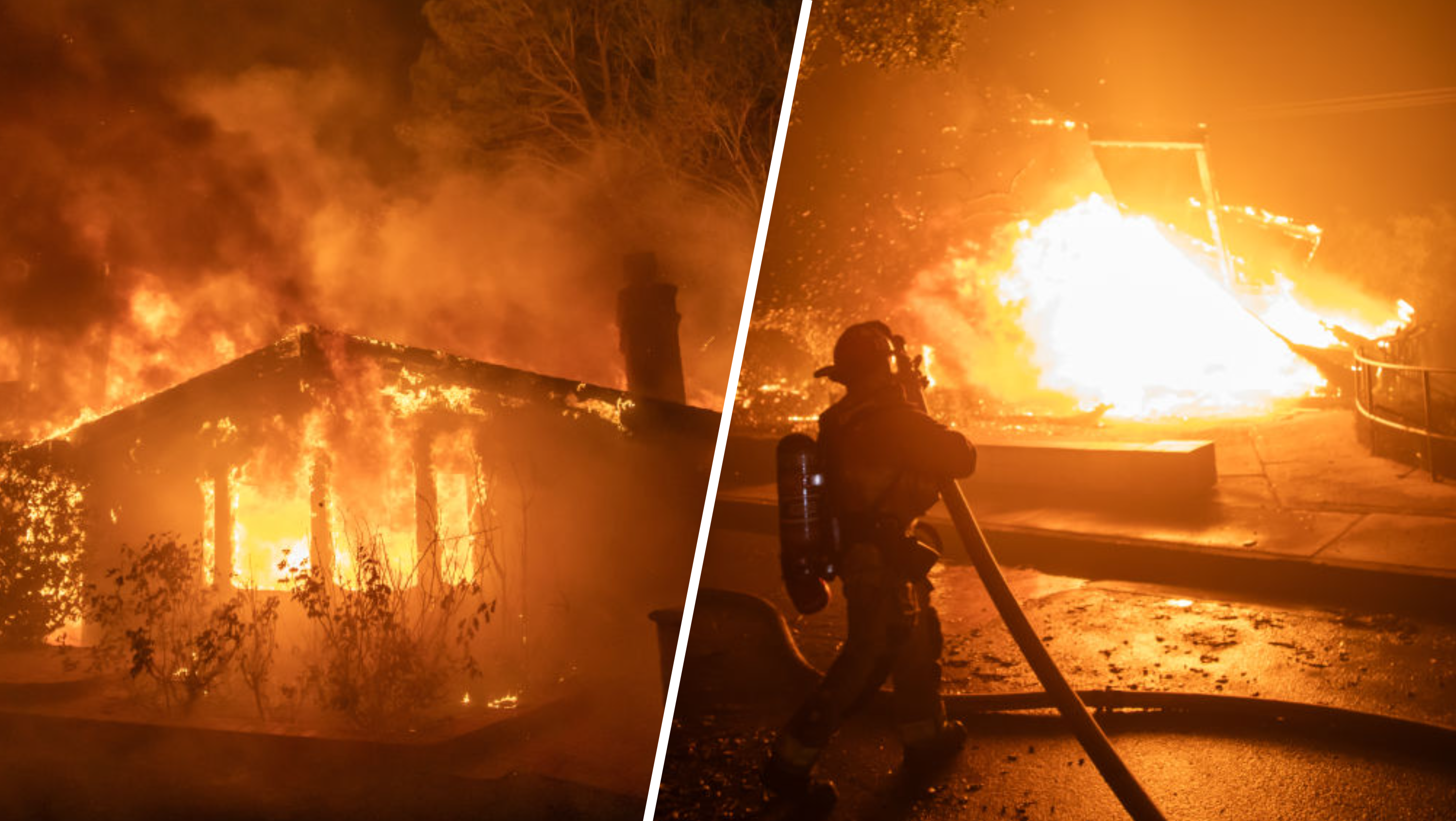When the yelling match between Diane Le's schizophrenic brother and their father escalated into shoving, Le did what families of the mentally disabled are repeatedly advised to do.
She called the police.
Hours later, Khoa Anh Le was dead. Investigators said the 37-year-old had been beaten, choked and tasered by the El Monte police officers whom the family had called for help.
"If I could go back in time, I wouldn't call for help," Diane Le told NBC4. "Because of my call, my brother is now gone."
Le died nearly a year after the high-profile death of Kelly Thomas, a schizophrenic man who died in July 2011 after being beaten by Fullerton police officers. The recent episodes have alarmed many in the mental health community.
Ongoing Coverage: The Kelly Thomas Case
Long worried that their loved ones would suffer at the hands of law enforcement officials who don't understand mental illness, family members and advocates say they don't know where to turn for help.
Local
Get Los Angeles's latest local news on crime, entertainment, weather, schools, cost of living and more. Here's your go-to source for today's LA news.
"I hear stories almost every week about families, and there's always this tension that maybe the police can help me contain and control this... or maybe it will go the other way," said Randall Hagar, director of government affairs for the California Psychiatric Association.
Khoa Anh Le died June 14 after he was tasered and beaten with a flashlight by two El Monte police officers who claimed the man began resisting and assaulting them, investigators said in a statement released June 19.
Similarly, 37-year-old Kelly Thomas died last year on July 10 -- five days after he was beaten into a coma by several Fullerton police officers.
The Los Angeles County Coroner has not yet ruled on the cause of Le's death, and El Monte police officers have admitted to an "altercation."
Family members are typically counseled to turn to police for assistance if they think their mentally ill loved ones might pose a threat. But the deaths of Thomas and Le have led some to worry that their loved ones could be hurt or even killed by officers arriving at the scene, despite efforts by law enforcement to improve training in many departments.
"There's no question in my mind that families are certainly, if not cautious, then afraid to call the police," said Brian Jacobs, government affairs chair for the National Alliance for Mental Illness (NAMI) in Orange County.
Improving relations
Last year, the LAPD launched a Mental Illness Program that sends psychiatric emergency response teams to respond to calls involving mentally disabled individuals. These teams, composed of LAPD officers and clinicians from the LA County Department of Mental Health, aim to minimize violent encounters between officers and the mentally ill, according to an LAPD news release from March 31, 2011.
Those teams are now available at the LA Sheriff's Department, LAPD and several -- but not all -- local police departments in LA County.
Kathleen Piché, spokeswoman for the Department of Mental Health, said her agency does not have a direct partnership with police officials in El Monte, where Le was beaten by two officers.
Hoang Huy Tu, Le's family attorney, said there were no mental health clinicians present during the altercation between Le and El Monte police officials.
Family members in cities without these specialized response teams expressed more concern with police intervention, and some said they would be more likely to call mental health workers or a clinic for help.
"I'm a lot less trustworthy of the police," said Carol Latta, a Lakewood resident whose 34-year-old son, Blake, has schizophrenia. "When they had their big NAMI (National Alliance for Mental Illness) walk in Santa Monica, I carried a big sign of Kelly Thomas that said 'Education was the key.' I'm very leery of police. I'd rather go to health care workers."
In areas that have special response teams, though, a majority of residents with mentally ill children said they would still reach out to the police for help.
Jeanmarie Beard, a Long Beach resident whose 19-year-old son is mentally ill, said local law enforcement is "well trained" and "real responsive" to mental health issues, adding that her community frequently invites police officers to NAMI events and workshops.
The Long Beach Police Department is one of a handful of local police departments in Los Angeles County with specialized response teams for people with mental illnesses. These teams made a total of 13,785 visits from 2010-2011, according to Piché.
Fred Magenheimer, co-president of NAMI in Long Beach whose 44-year-old son has paranoid schizophrenia, also said the recent events have not made him less likely to call the police, though he acknowledged that they have increased his fear of "things getting out of control."
Cathy Williamson, of Long Beach, said her 32-year-old son has paranoid schizophrenia and anosognosia, a condition that prevents disabled persons from recognizing their disability.
"I totally understand that [the police] don't know what they're coming up against or whether it's drugs or mental health issues," Williamson said. "But at the same time, I look at hostage situations and... they still take the time to de-escalate and try to talk the person down instead of jumping all over them."
"You know, shooting first and asking questions later," she added.
"Being a police officer"
Five mental health advocacy experts interviewed by NBC4 attributed a majority of altercations between police officers and the mentally ill to a lack of proper training.
Officers are typically taught to respond to situations through force and do not necessarily know how to handle a situation involving people with mental illnesses, experts said.
"One of the things that a police officer really can't avoid is being a police officer," said Rusty Selix, executive director for the California Council of Community Mental Health Agencies. "And police officers look like authority figures, not the kind of person that a schizophrenic person is likely to trust."
Officers are trained to increase the level of force when someone is noncompliant, a response that can increase the paranoia of the mentally ill and lead to a "bad result," Selix said.
Selix and Hagar both said the recent economic downturn has cut funding for local mental health budgets, forcing more mentally ill patients out on the streets and increasing the likelihood of an altercation with a police officer.
In addition, law enforcement officers are typically the first responders to emergency calls, raising the risk of a confrontation as "both parties misread each other," said Jim Preis, executive director of Mental Health Advocacy Services.
In the cases of Thomas and Le, both of whom had schizophrenia, experts said the victims’ illnesses made it harder for them to process information when police arrived.
"They're paranoid. They might be afraid that the officer is out to get them,” Hagar said. “So where officers make the mistake is in assuming willful disobedience in the part of somebody [with a mental illness] and then ratcheting up their force."
Looking ahead
All family members and mental health experts interviewed said they recognized that there is room for police relations with the mentally ill to improve.
Jacobs said he thinks mental illness is not prioritized highly enough in the health system, and Latta said she thinks police officers should engage more with local mental health organizations.
Le's family attorney, Tu, called for a change in the system.
"They've got to have a way that they can effectively deal with the mentally ill," he said. "Otherwise, these episodes will happen again and again."
Still, others said they think change will come gradually and that improvements have already been made since Thomas' death.
Ron Thomas, Kelly Thomas’ father, said he has noticed that since his son's death, more people have come forward to demand accountability among police officers and city council members.
"A lot has been learned from the death of my son," he said, citing public outcry to Kelly Thomas' death and the June recall of three Fullerton city council members as examples. "This is all changing now."
Follow NBCLA for the latest LA news, events and entertainment: iPhone/iPad App | Facebook | Twitter | Google+ | Instagram | RSS | Text Alerts | Email Alerts



